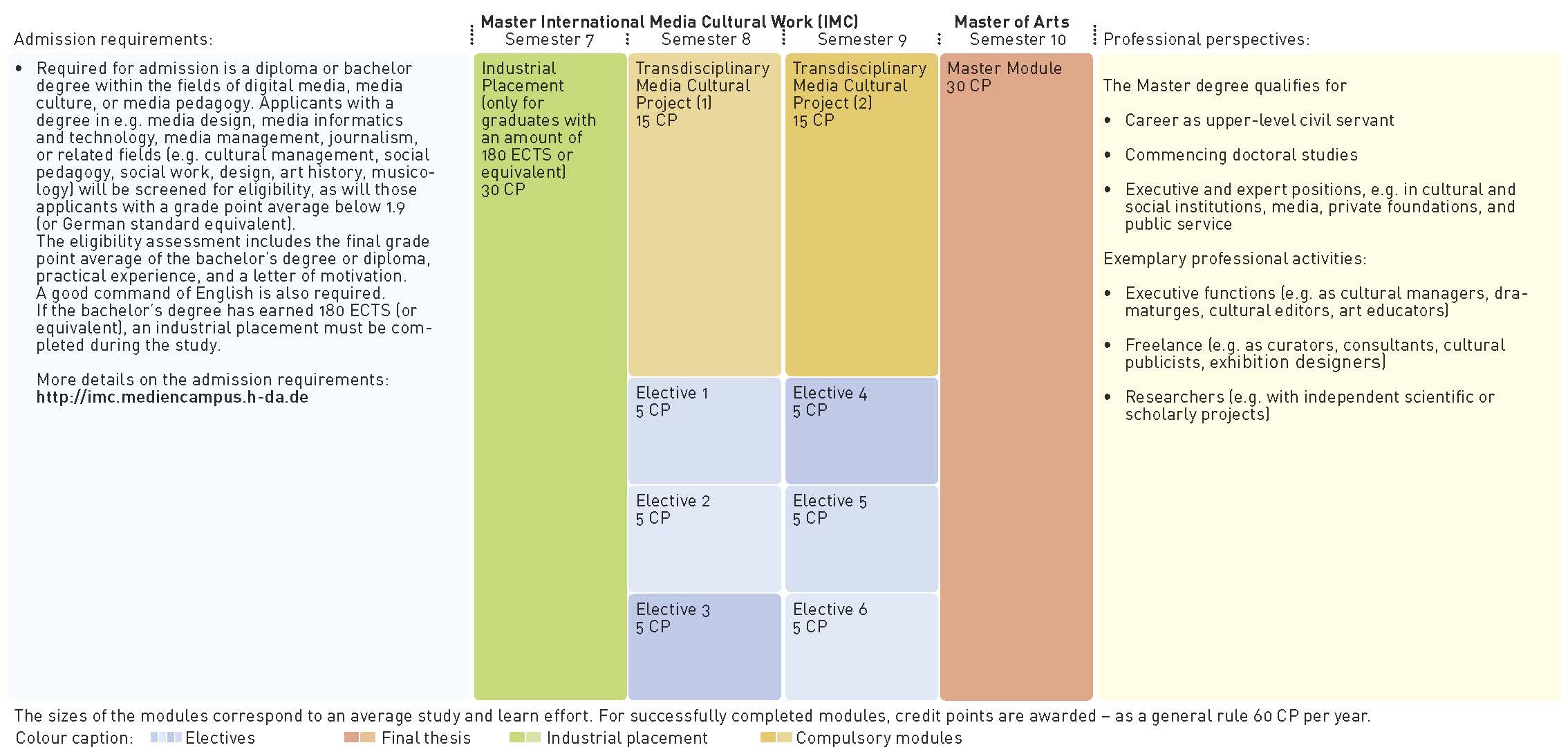International Media Cultural Work (IMC) (M.A.)
| Semester | 3/4 Semester |
| Dieburg | |
| Wintersemester / Sommersemester | |
| EN | |
| * |
Content
Curating – Communicating – Managing – These three terms span the huge field of digital media and its technologies, for which International Media Cultural Work will qualify its students as superbly imaginative leaders and strategically outstanding executives. During the program,students will focus on media aesthetic education and cultural communication to develop expertise in inspiring society to a deeper and critical understanding of media technologies’cultural implications, as well as their social and ethicalphilosophical dimensions. The course’s practical goal is to encourage society and individuals to use media for skillful self-expression, as well as for creative and emancipatory practices. The program is conducted in English. Its perspective is international and intercultural. The students will work in transdiscipline, collaborative, and experimental environments. Additional information on the study program can be found on the website of the study program International Media Cultural Work (IMC).
Perspective
Graduates in International Media Cultural Work enjoy an extensive field of career opportunities, including
- Executive positions (e.g. cultural managers, dramaturges, cultural editors, art educators)
- Independent freelance work (e.g. as curators, consultants, cultural publicists, exhibition designers)
- Researchers (e.g. with independent scientific or scholarly projects)
Employers may be cultural institutions, media companies, educational organizations, or industrial or economic corporations.
Structure
Per semester, one compulsory module (Transdisciplinary Media Cultural Projects/TMCPs) has to be attended as well as three electives. The third/fourth semester is dedicated to the master project. The TMCPs are research-oriented, merging theoretical knowledge, communicational concepts, technological methods, managerial steering strategies with cultural practices. The electives within the field of Curating and Communicating are complemented by electives from the field of Management and Technology. They can be selected according to personal specializations. You will find a detailed description of the course contents in the module manual (German).
*Access
A diploma or bachelor degree is required from the following fields: digital media, media culture, or media pedagogy. Applicants with a degree in related fields (e.g. media design, media informatics and technology, media management, journalism), or adjacent fields (e.g. cultural management, social pedagogy, social work, design, art history, musicology) will be checked for eligibility, as will those applicants with a grade point average below 1,9 (or German standard equivalent). The eligibility assessment, includes the final grade point average of the bachelor’s degree or diploma, practical experience, and a letter of motivation. A good command of English is also required. More info: http://imc.mediencampus.h-da.de. A detailed description of the admission requirements can be found in the Special Provisions of the Examination Regulations (German) as well as in the Admission Regulations (German).
Registration deadline (German certificate)
01.02./01.09.
international student applicants
Experiences
“I am very impressed by the forward thinking and visionary approach shown in the structure of IMC: it shows careful balancing of highly and for cultural media outreach today, very relevant theoretical subjects coupled with great opportunities for practical work. I am sure this program will become internationally recognised, for its excellence and for providing a new direction in social and artistic cultural dissemination through media.“
Catherine Milliken (Australia/Germany), composer, director of international cultural and artistic projects; director of the Education Program for the Berliner Philharmoniker (2005-2012).
“IMC’s media cultural concept is based on internationality and social diversity. This is unique in Germany and broadens not only the general effectiveness of media cultural communication,
but also gives a professionally broad, international base to the program’s graduates. The latter is very seminal for a sustained employability.“
Stephen Kovats (Canada/Germany), Founding Director of „r0g_agency for open culture and critical transformation gGmbH“ Artistic Director of the „transmediale Festival für Kunst und digitale Kultur“, Berlin (2007-2011).
Contact
Sabine Breitsameter
+49.6151.533-69465
sabine.breitsameter@h-da.de
1
Sprechstunde
Nach Vereinbarung per Mail
Decision advice
We help you find the right degree programme Central Student Advisory Service
Media campus Online
At mediencampus.h-da.de you will find news and dates of all media study programmes as well as project presentations.
